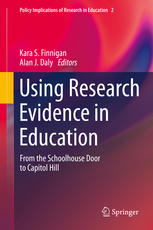

Most ebook files are in PDF format, so you can easily read them using various software such as Foxit Reader or directly on the Google Chrome browser.
Some ebook files are released by publishers in other formats such as .awz, .mobi, .epub, .fb2, etc. You may need to install specific software to read these formats on mobile/PC, such as Calibre.
Please read the tutorial at this link: https://ebookbell.com/faq
We offer FREE conversion to the popular formats you request; however, this may take some time. Therefore, right after payment, please email us, and we will try to provide the service as quickly as possible.
For some exceptional file formats or broken links (if any), please refrain from opening any disputes. Instead, email us first, and we will try to assist within a maximum of 6 hours.
EbookBell Team

4.4
22 reviewsThis book includes a set of rigorous and accessible studies on the topic of “research evidence” from a variety of levels and educational vantage points. It also provides the reader with thoughtful commentaries from leading thinkers in the field. The complex process of acquiring, interpreting, and using research evidence makes for a rich and under examined area in educational research, practice and policymaking. Policy makers, practitioners and scholars are in need of additional knowledge and practical steps in terms of the uptake of evidence into practice. In addition, sharpening understanding in terms of the ways in which research evidence is shaped or adapted at different educational levels (school, district, state, federal) as well the factors that support or constrain the acquisition and use of research evidence is of immediate use.
While professional support for evidence-based practice in schools has never been stronger, credible research has found only weak large-scale effects. This book provides us with key insights about the nature of this problem and a comprehensive approach to its solution; it is a major step toward realizing the considerable potential for school improvement of reciprocal working relationships among policy, practice and research communities. Ken Leithwood, Emeritus Professor, OISE/University of Toronto
The problem of scant research use at school sites is old, but the federal to classroom level scope of this book is unique. The authors' analysis of the current status leads to despair, but they provide a clear and compelling path forward. Michael Kirst, Professor Emeritus, Stanford University; President, California State Board of Education.
We have come a long way since the linear "Research, Dissemination, Utilization" models of knowledge use of the 1970s and 80s. Each chapter in this book lays out new directions for understanding how individuals, relationships and systems advance or impede the movement of new ideas into policy/practice. Taken together, they redefine knowledge use as a dynamic process that affects and is affected by specific characteristics of the social structures in which is occurs. It is a "must read" both for those interested in educational change and organizational theory. Karen Seashore Louis, Regents Professor, University of Minnesota